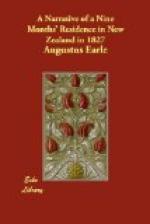Captain Marion, who, from his ship, was an eye-witness of these horrid murders, instantly hastened on shore with the remainder of his crew to avenge the slaughter of his countrymen. Led on more by ardour than prudence, he suffered himself to be surrounded; was overpowered by numbers, defeated, and every one was put to death!
This account of George’s does not, I acknowledge, exactly agree with the published narrative of that unfortunate event, nor does his age agree with the dates. Only a few years elapsed between the time of Cook and Marion, yet he declares himself to have been a child at the death of the navigator, and a man at the murder of the latter; but as it was voluntary on his part to give me the above detail, and even if he were not present himself, he most probably had the facts from one who was, I thought it worth inserting, as tending to throw light on one of the most melancholy events which ever took place on these coasts.
George also related to me the dreadful tragedy of the ship Boyd, and, horrible as these relations were, I felt a particular interest, almost amounting to pleasure, in hearing them related by an eye-witness; one who had been an actor in those bloody scenes which I had before read of: narratives which from my very childhood had always possessed particular charms for me; and at this time I was not only looking on the very spot the hero of my imagination, Cook, had trod, but was hearing the tale from one who had actually seen him; and was listening to every particular concerning the transactions of Marion and his men, as though they had just taken place.
Even in the dreadful destruction of the Boyd, George laid the blame entirely on the English, and spoke with great bitterness of the ill-treatment of Philip, the native chief, who came as passenger in the ship. He described and mimicked his cleaning shoes and knives; his being flogged when he refused to do this degrading work; and, finally, his speech to his countrymen when he came on shore, soliciting their assistance in capturing the vessel, and revenging his ill-treatment. Over and over again our friend George, having worked up his passion by a full recollection of the subject, went through the whole tragedy. The scene thus portrayed was interesting although horrible. No actor, trained in the strictest rules of his art, could compete with George’s vehemence of action. The flexibility of his features enabled him to vary the expression of each passion; and he represented hatred, anger, horror, and the imploring of mercy so ably that, in short, one would have imagined he had spent his whole life in practising the art of imitation.
CHAPTER XXXIV.
THE MAORI VIEW OF CHRISTIANITY.




